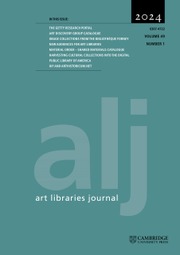No CrossRef data available.
Article contents
Old and new problems of Russian art libraries
Published online by Cambridge University Press: 06 June 2016
Abstract
As a result of the momentous changes taking place in Russia, people and institutions have acquired a new freedom which they have not been prepared for. Art libraries can offer opportunities for people to use their freedom well, but their collections are inadequate and they are desperately short of money. At the same time, prices of books have risen sharply, and the introduction of charges for inter-library lending is inhibiting smaller libraries from borrowing material for their users. Library collections are being depleted by theft, sometimes perpetrated by hard-up librarians. Cooperation between art libraries could help, but libraries accustomed to a rigid centralized system scarcely know how to begin to cooperate voluntarily; nonetheless, some first steps have been taken by a number of Moscow’s art libraries. Russian art libraries are of several kinds, notably museum libraries, serving their own institutions in the first instance, and art departments of large public libraries, but there is no national art library to serve as the focal point of a network; in the absence of cooperation and networking, collection development and stock-editing are guided only by the immediate needs of particular libraries. Russian libraries, not least the Library of Foreign Literature, desperately need not only to develop networking at home, but also to establish links with libraries abroad.
- Type
- Research Article
- Information
- Copyright
- Copyright © The Art Libraries Society 1992
References
Note
1. The Library of Foreign Literature has opened bookshops and established a publishing house in conjunction with a French publisher. It provides accommodation to both the British Council and the French Cultural Centre. It earns hard currency through an arrangement with the BBC’s Russian service.


